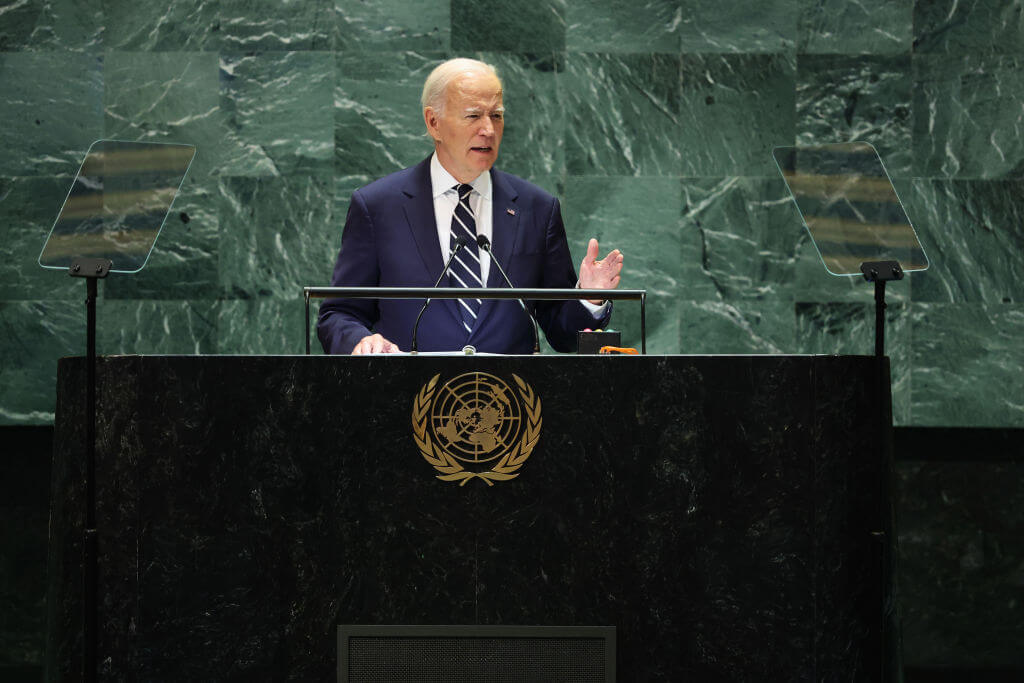In final UN speech, amid expanding Mideast war, Biden says peace is still realistic
‘I know many look at the world today and see difficulties and react with despair,’ he said. ‘But I do not; I won’t.’

President Joe Biden speaks during the United Nations General Assembly Sept. 24. Photo by Michael M. Santiago/Getty Images
In his final address as president to the United Nations General Assembly on Tuesday, President Joe Biden drew on his experience as an elder statesman, and said a full-scale war in the Middle East could still be avoided, even as Israel ramps up airstrikes against Hezbollah targets in Lebanon and ceasefire negotiations in Gaza remain stalled.
“A full-scale war is not in anyone’s interest,” Biden said. “Even as the situation has escalated, a diplomatic solution is still possible.”
Biden reportedly told his national security team recently that securing a hostage-ceasefire deal in Gaza is the top priority for the remainder of his term. The president sees it as a way to cement his legacy as a peacemaker and help Vice President Kamala Harris win the presidency in November. Politico reported Monday that during a recent meeting at the Situation Room, Biden told his team to “keep f—ing trying” to finalize a deal.
Biden also addressed the wars in Ukraine and Sudan, and violence in Haiti, in his U.N. speech. He said “despair” is fruitless, and recalled the war raging between Israel and Egypt when he entered politics five decades ago, and how those countries then “forged a historic peace.”
“I know many look at the world today and see difficulties and react with despair,” he said. “But I do not; I won’t. As leaders, we don’t have the luxury.”
On the Israel-Hamas war Biden said the international community must remember the terror group’s brutality on Oct. 7: its invasion of a sovereign state and murder of more than 1,200 people. He spoke in personal terms of the 101 hostages still held in Gaza.
“I’ve met with the families of those hostages. I’ve grieved with them. They’re going through hell,” Biden said.
Biden also acknowledged the suffering of Palestinian civilians in Gaza. “Innocent civilians in Gaza are also going through hell,” Biden said. “They did not ask for this war that Hamas started.”
Avoiding a full-blown war in the Middle East
Biden, in his 25-minute address, said he remains committed to the hostage-ceasefire deal he put forward with Qatar and Egypt in May, which has also been endorsed by the U.N. Security Council. “Now is the time for the parties to finalize its terms,” he said. “Bring the hostages home, and secure security for Israel and Gaza free of Hamas’ grip, ease the suffering in Gaza, and end this war.”
Biden also warned of the threat of a wider regional war, though he seemed to approve of the Israeli actions in recent days, pointing to Hezbollah’s “unprovoked” rocket fire along the Israeli-Lebanon border since Oct. 7. But he said a diplomatic solution “remains the only path” to restoring security and allowing the citizens to return to their homes along the border.
The president also said a two-state solution to the Israeli-Palestinian conflict, and the curtailment of violence against innocent West Bank Palestinians, “will put us in a stronger position to deal with the ongoing threat posed by Iran.”
“Together, we must deny oxygen to its terrorist proxies, which have called for more Oct. 7s, and ensure that Iran will never, ever obtain a nuclear weapon,” Biden said.
The Middle East conflict is high on the agenda of the U.N. General Assembly. Iranian President Masoud Pezeshkian, Jordan’s King Abdullah II and the Qatari leader, Sheikh Tamim bin Hamad Al Thani, are expected to speak later in the day. Israeli Prime Minister Benjamin Netanyahu is expected to speak on Friday.
Turkish President Recep Tayyip Erdoğan, who has deepened the rift between his country and Israel with his criticism of the war in Gaza, spoke to the Assembly after Biden, and compared Netanyahu to Hitler. “Just as Hitler was stopped by the alliance of humanity 70 years ago, Netanyahu and his murder network must also be stopped by the alliance of humanity,” Erdoğan said.
In a statement Tuesday morning, Netanyahu referred to the Turkish leader as someone “renowned for slaughtering Kurdish civilians and jailing journalists.”
A message from our Publisher & CEO Rachel Fishman Feddersen

I hope you appreciated this article. Before you go, I’d like to ask you to please support the Forward’s award-winning, nonprofit journalism so that we can be prepared for whatever news 2025 brings.
At a time when other newsrooms are closing or cutting back, the Forward has removed its paywall and invested additional resources to report on the ground from Israel and around the U.S. on the impact of the war, rising antisemitism and polarized discourse.
Readers like you make it all possible. Support our work by becoming a Forward Member and connect with our journalism and your community.
— Rachel Fishman Feddersen, Publisher and CEO


























